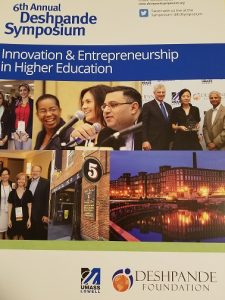Jul
25

Posted by Susan Halpin on July 25th, 2017
Posted in: Blog, NLM Resources, Patient Engagement
Three hundred leaders from universities, business i ncubators, foundations and other organizations across the United States recently gathered at the University of Massachusetts, Lowell for the 6th Annual Deshpande Symposium on June 12th through 14th. The annual symposium is the result of a partnership between The Deshpande Foundation (http://www.deshpandefoundation.org/) and the University of Massachusetts, Lowell. The goal was to bring together academics, policy planners, and practitioners to develop and share best practices for integrating entrepreneurship into the curriculum of higher education.
ncubators, foundations and other organizations across the United States recently gathered at the University of Massachusetts, Lowell for the 6th Annual Deshpande Symposium on June 12th through 14th. The annual symposium is the result of a partnership between The Deshpande Foundation (http://www.deshpandefoundation.org/) and the University of Massachusetts, Lowell. The goal was to bring together academics, policy planners, and practitioners to develop and share best practices for integrating entrepreneurship into the curriculum of higher education.
As I sat at my exhibit table, chockful of printed literature promoting the vast and varied resources of the National Library of Medicine (NLM), I had the opportunity to chat with several movers and shakers of cutting-edge innovation during their breaks between workshops. Many symposium participants were from the health and medical fields, yet were not familiar with the National Library of Medicine and its mission to improve public health by making their online resources freely available to everyone. If you are not familiar with the National Library of Medicine, their free digital resources, free training classes and grant funding opportunities, take a look at the NLM website https://www.nlm.nih.gov/ As I got to know about the work each person was involved in, we discussed how NLM resources could be of value in their work.
Evidence-based research data can be obtained through NLMs more well-known products like PubMed and MedlinePlus. Did you know that as of July 2017, PubMed, NLM’s free search engine contains more than 27.3 million citations for biomedical information from peer-reviewed life science journals and online books? PubMed could be a very useful tool for market research or any other health-related research. Likewise, NLM’s consumer-friendly website, MedlinePlus, provides easy-to-understand information and also links to health information from NIH and many other federal government agencies and non-government websites.
NLM has other evidence-based tools and useful mobile apps that also could be very useful for higher education and entrepreneurial ventures. Reed McManigle, a symposium participant I chatted with, is the Mentor-in-Residence at Carnegie Mellon’s Center for Technology Transfer and Enterprise Creation. After learning about NLMs wealth of resources and tools, Reed has recommended to the entrepreneurs he advises that they investigate the incorporation of NLM resources into some part of their health-related app development. Tamar Krishnamurti, an Assistant Professor in the Department of Engineering and Public Policy, is one of the entrepreneurs Reed advises. Tamar is developing an app to help women avoid complications and pre-term births. When I spoke to Tamar, we looked at various NLM tools like Embryo (https://www.nlm.nih.gov/mobile/index.html), Daily Med, (https://dailymed.nlm.nih.gov/dailymed/) and the Household Products Database (https://householdproducts.nlm.nih.gov/) as a few useful resources that have potential use for either background information during app development or as a part of the app she is developing to evaluate potential pregnancy risks. Likewise, Jeremy Guttman, also from Carnegie Mellon, is developer working on a system of data collection and targeted feedback to help people who are struggling with addiction. After learning about NLM resources related to addiction, like the new opioid and addiction portal (https://sis.nlm.nih.gov/enviro/addiction.html) that includes links to reliable, vetted information covering a number of aspects related to the opioid crisis, Jeremy is looking at how he may use these evidence-based resources in his project. Other NLM resources like Clinical Trials (https://clinicaltrials.gov/) and the K-12 Science and Health Education portal (https://sis.nlm.nih.gov/outreach/k12.html#) are just a couple of other lesser known NLM resources that also have potential to add value health and medical entrepreneurial projects.
Now that you have been introduced to just a few of the NLM resources, see how these resources can add evidence-based value to your work. Consider joining the NLM network (https://nnlm.gov/members/join-network)–it’s free. Start taking advantage of all that NLM has to offer — free digital resources, free training classes and grant funding opportunities.